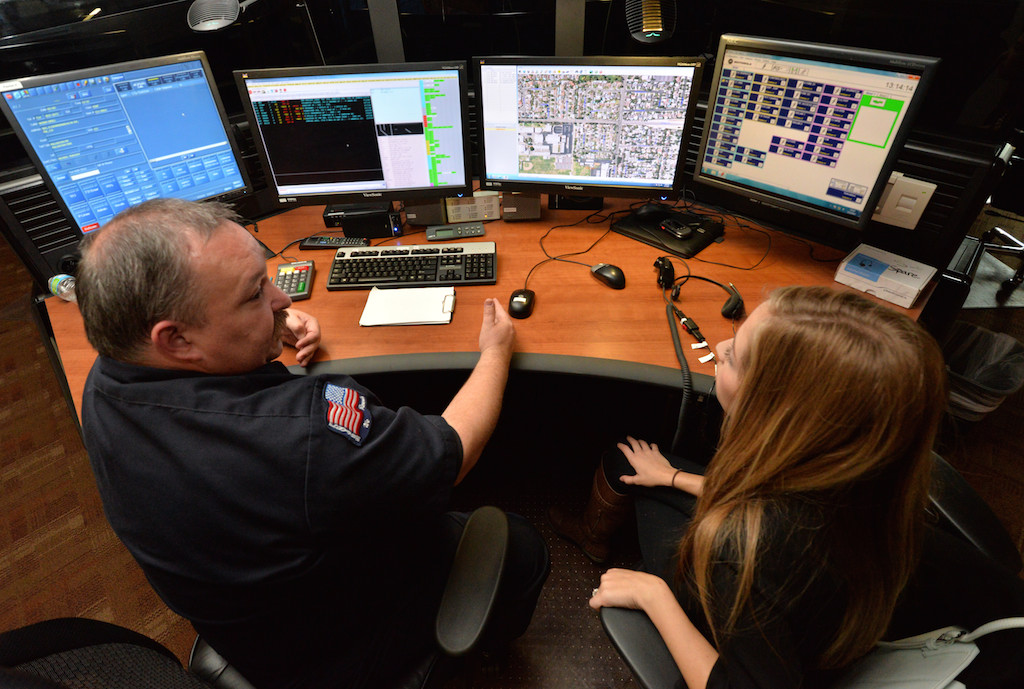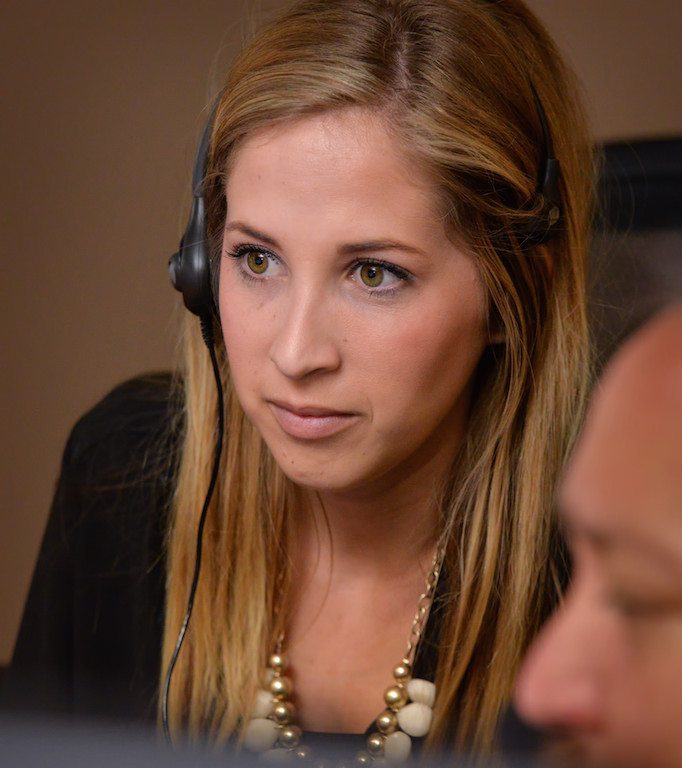Get lost.
That’s one of several pieces of advice a veteran emergency fire dispatcher has for anyone considering getting into the profession.
But Mike Bates, a lead dispatcher at Metro Cities Fire Authority (Metro Net) in Anaheim, was being very literal:
Know the area you want to serve as a dispatcher.
Bates offered this and several other tips to a young woman, Allie Kuramata, 24, of Fontana, who recently shadowed him for a few hours at the Metro Net emergency communications center in Anaheim West Tower, home to Anaheim Fire & Rescue headquarters.
“Knowing your geography is important,” said Bates, a 13-year Metro Net dispatcher who earlier in his career used to purposely get lost and drive around to get a good feel for areas.
Metro Net Fire Dispatch provides 911 Fire and EMS dispatch services to more than 1.2 million people in Anaheim, Brea, Fountain Valley, Fullerton, Garden Grove, Huntington Beach, Newport Beach and Orange.

Mike Bates, lead dispatcher with Metro Cities Fire Authority, give advice and tips to Allie Kuramata, 24, of Fontana. who is looking into becoming an emergency fire dispatcher.
Photo by Steven Georges/Behind the Badge OC
Bates is one of Metro Net’s 23 full-time dispatchers and supervisors. The agency also employs eight part-time dispatchers.
Here’s some of the advice the 42-year-old married father of four and Irvine resident gave to Kuramata:
Know your geography — About 75 percent of the roughly 275,000 emergency calls that come into Metro Net each year are from people on cell phones. In many cases, the caller can’t offer a lot of specifics about his or her location, Bates said. So knowing streets and landmarks is critical.
“With new GPS technology, a dispatcher can identify a general location but we cannot rely just on technology,” Bates said.
“A person on the 22 (Garden Grove) Freeway might call and I’ll ask, ‘Which direction are you traveling?’ And the caller will say, ‘I think I’m heading toward the beach.’ But the 22 doesn’t hit the beach. So then I will ask the caller, ‘Well, what do you see?’ Some callers are landmark oriented, some are direction oriented. As a dispatcher, you need to be able to deal with all sorts of situations.”
Be able to detach from work — Giving instructions all day to people who most likely are experiencing or witnessing the most traumatic experiences of their lives can take a toll, Bates said.
“At the end of the day, we typically can go home and unplug and recover from a shift,” he said. “We usually don’t have projects or deadlines coming up that would require taking work home. I’m able to go home and be with my family, do some activities — that sort of thing. So this career is for somebody who is able to separate himself or herself from work.”
Be a good listener — You need to be able to get a caller to cut to the chase and tell you what is going on, Bates said. Interestingly, he noted, people who are experiencing something major and life threatening — say, having a baby, or calling about someone who has stopped breathing — tend to be more calm than someone who calls about cutting their toe.
“Those callers often are in a total panic,” said Bates, who before becoming a full-time Metro Net dispatcher in November 2002 drove busses, transported bodies for the coroner and mortuaries, and served as a dispatcher for Care Ambulance Service.
“Maybe because they see a lot of blood,” Bates said.

Allie Kuramata, 24, of Fontana, listens to a 911 call at Metro Net in Anaheim.
Photo by Steven Georges/Behind the Badge OC
Embrace night and holiday shifts — Dispatchers, especially new ones, are going to work a lot of nights and holidays. The graveyard shift at Metro Net is 7 p.m. to 7 a.m.
Bates and his fellow full-time Metro Net dispatchers work five 12-hour shifts and two 10-hour shifts every two-week period. They select their shifts by seniority several months ahead so they can plan for vacations, etc. During every 12-hour shift, dispatchers get a half-hour lunch and two 15-minute breaks.
At Metro Net, Bates said, many dispatchers prefer working nights because typically, days are busier.
Other words of wisdom from Bates:
— “It’s not a job, it’s a lifestyle for us.”
— “This job requires someone who can think quickly, stay within the protocol and follow rules, and stay calm.”
— “You need to be tech savvy and be a multi-tasker.”
— “A thick skin is good. Panicky callers sometimes will yell at us.”
— “You have to realize you rarely ever learn about an outcome of a call, so you have to be able to accept that.”
— “You don’t need to be an EMT to be a fire dispatcher, but you need to be CPR and EMD certified.”
— In addition to on-the-job training, CPR and EMD certification (for emergency medical dispatch, typically a three-day course), dispatchers undergo continued education every month and recertification training every two years, said Gary Gionet, manager of Metro Net.
And every month, Gionet said, a certain number of a dispatcher’s calls are randomly selected for review to make sure the dispatcher is performing to high standards.
— If interested, enroll in a POST-certified course at a community college. A high school diploma is required.
As for Kuramata, she said she loved her time with Bates and learned a lot.
So much, in fact, that recently she took a test to become a dispatcher with the Ontario Fire Department.
“I loved the atmosphere, and nothing scared me away,” Kuramata said of the experience. “It seems like a very rewarding career.”
 Behind the Badge
Behind the Badge



